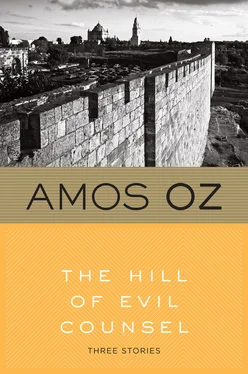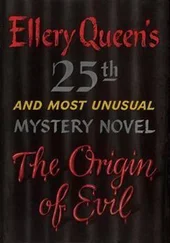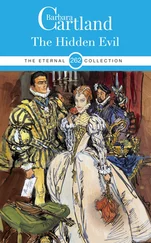Father would put on Mother's apron and wash up. He would rinse the plates one by one in a bowl of cold water. I would stand next to him and dry them. Mother would put some of them away and lay the others out on the kitchen table, ready for tomorrow's breakfast. It would be calm. We might sit down together to sort through the collection of picture postcards. I would be sent off to wash and get into my pajamas, while they sat outside on the balcony inhaling the smells of the night. From my bedroom window I would be able to see the lights in the workshop and Ephraim's room: all night long he would experiment with radio waves and listen to the wailing of the stars, while the old man would add or remove a row of matchsticks in the wall of his Temple. If the left-hand shutter were to be closed, I would know that Ruhama or Esther the divorcee or some other girl had managed to force an entry. Things that I adamantly refused to think about were happening there, to the accompaniment of the wailing of the stars. I don't want to know. I don't even care. I think fighting men shouldn't indulge in love and suchlike. Love can wait till after the victory. Love can make you suddenly give away secrets, and then there is no going back. I remember that when they wrote URI LOVES BAT-AMMI on the wall I asked her if she thought we might ever get married. Of course, I added, only after the British have been driven out and the Hebrew state has been established.
Bat-Ammi thought that she could only fall in love with a man who knew exactly what he wanted and could never be deflected from his purpose. Someone determined but considerate, she said.
I promised to guard her secret, so that no one would take advantage of her.
That made her laugh.
"Calm down," she said. "Why are you shaking like that? What do you want to have secrets with me for? What's the matter with you?"
I said that nothing was the matter and I didn't need to calm down. Bat-Ammi let me count with my finger the flowers her mother had embroidered around the neck of her Russian blouse. "But don't start getting ideas," I said.
"What's the matter with you? Who's getting ideas about who? Calm down."
I was sorry for Bat-Ammi, and that was why I did not argue with her. Let her say what she liked. I was sorry for her because that summer she'd started growing breasts and, her big brothers said, hairs, too. I was sad because there was no way back, and Bat-Ammi could never stop these growths and be the same as she had been before. Even if she tried with all her might, she could never go back now. She was never consulted about it. She had to turn into a woman, and I was sorry for her. She would never ever be a little girl again. She would never be able to ride a boy's bike.
It's none of my business. I don't want to think about what Bat-Ammi's growing and things like that. I'm Ephraim's lieutenant. I'm going to live beyond the mountains all on my own in the sun in the wind without disgusting thoughts. I'm going to be tough.
Before getting into bed, I watched Bat-Ammi's big brothers roasting potatoes in a bonfire in the garden and burning a rag effigy. I expect they had called it Ernest Bevin, to get their revenge on the anti-Semitic British minister. Presently the moon appeared, sailing quickly between two water cisterns on the roof opposite. The Grill brothers peed into the fire onto their potatoes and they didn't know I was standing at my window watching. They scattered furtively, bubbling over with malicious glee, lying in wait for the girls coming back from their evening classes at the Lemel School. They were going to tempt the girls into eating the potatoes they had peed on. They would nudge one another, and they wouldn't be able to contain their snickers.
Even at night, by the light of the moon, the British soldiers did not stop bustling about their parade ground inside the Schneller Barracks. They seemed to me to be dropping with fatigue as I watched from my window. What a long way to Tipperary. People were saying that next week the High Commissioner might be coming to review the garrison. They were also saying that the commander of the Underground was hiding somewhere in Jerusalem, planning the last details of the Revolt.
Half asleep, I could catch snatches of my parents' conversation from the rear balcony. Father said:
"Tomorrow or the day after, we'll start printing New Year's cards. The beginning of August is only two days off."
Mother said: "Your Ephraim will end up electrocuting himself or blowing himself up. If he's not working all night, he's away for days on end. I think he's making mines and bombs and things for the boys. He's already turned Uri's mind. I've got a feeling it's all going to end in trouble."
Father said:
"Ephraim's in love with you, or something."
He gave a quick little laugh, as if he had accidentally said a dirty word.
Mother answered seriously:
"What a mistake."
But she did not specify whether it was Father or Ephraim who was making the mistake.
Then they fell silent. Father was probably quietly chewing his mint leaves, while Mother was deep in thought. The moon had left my window and crossed the lane. Perhaps it had stopped over our roof and was feeling the sheets and vests on the clothesline. I put my light out. I hid my head under the pillow and made myself a cellar. It's going to be a crucial autumn. What does crucial autumn mean. Where does Ephraim go on his wanderings. Printing New Year's cards seemed to me boring, pathetic, and shameful. There are those dogs barking again. And then the usual shouts. Comrade Grill, who was a driver in the Hammekasher bus cooperative and always came home after ten o'clock, had presumably awakened his four children as usual, lined them up in the passage, and given them a good hiding for all the day's pranks. In the middle of the beating Boaz suddenly cursed his father with the words "I wish you were dead." A moment later there was a rumbling, grating sound, like barrels being rolled. Helena Grill let out a piercing scream that must have roused the whole neighborhood:
"Murderer! Cossack! Help! He's murdering the child!"
At once there was silence.
It was my duty to get up right away and rescue Bat-Ammi.
Too late. The Grill household was in blackest silence. The Cossacks had come and butchered them and their children. A thick stream of blood was pouring down the stairs and would soon reach the street. I'll stay awake all night, I decided, I'll hear with my own ears once and for all whether there are spies abroad, whether Mother sneaks out before dawn, or Ephraim comes creeping to our house, whether the commander of the Underground rides through the night on his horse. I'll stay awake till I've found out. But as soon as I had made the decision I fell asleep, because yet another blazing blue summer's day had come to an end and I was very tired.
6
The soil in the backyards had turned to khaki in the summer heat; the parched oleanders had gone gray. The geranium stems were taking on a coppery tinge. Dry thistles stood waiting for the fire.
There was junk scattered everywhere, broken crockery, rusty cans, flattened cartons, remains of mattresses, fragments of the foreign packing cases in which the settlers had transported their belongings from Poland and Russia.
One morning I made up my mind to rejuvenate it all. To make a garden.
I made a furious start by attacking the rude words that the Grill boys had scratched on the rusty gate. I scrubbed at them with a damp cloth. In vain. I covered them with mud. In vain. I found a broken bottle and tried to scrape the writing off. I did not notice the cut until my gym shorts and vest and even my hair were covered with blood. So I abandoned the operation. After the victory, when the British had been driven out, a new era would begin. Then we would plant the whole country with beautiful gardens. Meanwhile, I went indoors, bleeding like a hero in the pictures, and Mother had a terrible fright.
Читать дальше











